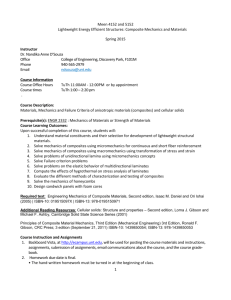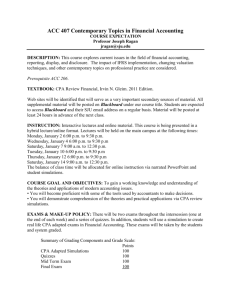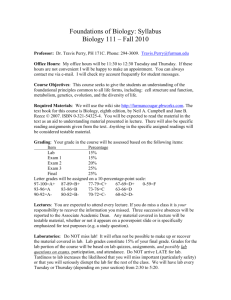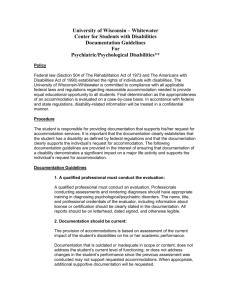ELET4770. 001 High Frequency Systems II Instructor: Shuping
advertisement
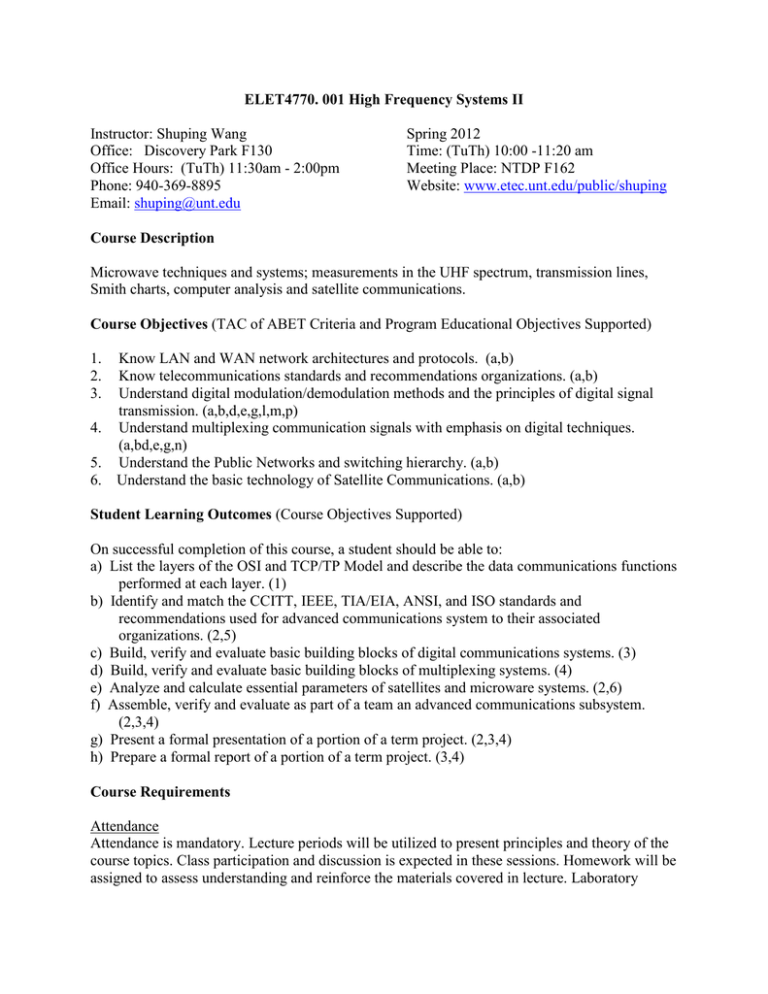
ELET4770. 001 High Frequency Systems II Instructor: Shuping Wang Office: Discovery Park F130 Office Hours: (TuTh) 11:30am - 2:00pm Phone: 940-369-8895 Email: shuping@unt.edu Spring 2012 Time: (TuTh) 10:00 -11:20 am Meeting Place: NTDP F162 Website: www.etec.unt.edu/public/shuping Course Description Microwave techniques and systems; measurements in the UHF spectrum, transmission lines, Smith charts, computer analysis and satellite communications. Course Objectives (TAC of ABET Criteria and Program Educational Objectives Supported) 1. 2. 3. 4. 5. 6. Know LAN and WAN network architectures and protocols. (a,b) Know telecommunications standards and recommendations organizations. (a,b) Understand digital modulation/demodulation methods and the principles of digital signal transmission. (a,b,d,e,g,l,m,p) Understand multiplexing communication signals with emphasis on digital techniques. (a,bd,e,g,n) Understand the Public Networks and switching hierarchy. (a,b) Understand the basic technology of Satellite Communications. (a,b) Student Learning Outcomes (Course Objectives Supported) On successful completion of this course, a student should be able to: a) List the layers of the OSI and TCP/TP Model and describe the data communications functions performed at each layer. (1) b) Identify and match the CCITT, IEEE, TIA/EIA, ANSI, and ISO standards and recommendations used for advanced communications system to their associated organizations. (2,5) c) Build, verify and evaluate basic building blocks of digital communications systems. (3) d) Build, verify and evaluate basic building blocks of multiplexing systems. (4) e) Analyze and calculate essential parameters of satellites and microware systems. (2,6) f) Assemble, verify and evaluate as part of a team an advanced communications subsystem. (2,3,4) g) Present a formal presentation of a portion of a term project. (2,3,4) h) Prepare a formal report of a portion of a term project. (3,4) Course Requirements Attendance Attendance is mandatory. Lecture periods will be utilized to present principles and theory of the course topics. Class participation and discussion is expected in these sessions. Homework will be assigned to assess understanding and reinforce the materials covered in lecture. Laboratory experiments will be conducted to provide hands-on applications of the theory as well as experience in the use of standard test equipment and computer application software. Homework is due at the beginning of the class period. There may be random quizzes administered during the semester. Late homework will not be accepted without advanced instructor authorization. Required text 1. Principles of Electronic Communication Systems, Louis E. Frenzel, McGraw Hill, 3rd edition, ISBN 978-0-07-310704-2, 2008. 2. Experiments Manual for Principles of Electronic Communication Systems, Louis E. Frenzel, McGraw Hill, 3rd edition, ISBN 978-0-07-310705-9, 2008. Exams There will be two exams (this includes the final exam), each worth 100 points. Exams will be based on text readings, handouts, class exercises, and class lectures and discussions. Students are responsible for all text material, regardless of whether we review the text material in class or not. Missed Exams You will be allowed to make up a missed exam only if you have a documented university excused absence. If you know in advance that you will miss an exam, you MUST contact me before the scheduled exam. Make-up exams will not contain the same questions. Grading Elements and Weights Homework/Quizzes: Midterm Examination: Laboratory: Final Examination (comprehensive): 15% 30% 25% (5% on Project) 30% Grade Distribution Points 90.0% - 100% 80.0% - 89.9% 70.0% - 79.9% 60.0% - 69.9% 59.9% & Below Letter Grade A B C D F Disabilities Accommodation The University of North Texas complies with Section 504 of the 1973 Rehabilitation Act and with the Americans with Disabilities Act of 1990. The University of North Texas provides academic adjustments and auxiliary aids to individuals with disabilities, as defined under the law. Among other things, this legislation requires that all students with disabilities be guaranteed a learning environment that provides for reasonable accommodation of their disabilities. If you believe you have a disability requiring accommodation, please see the instructor and/or contact the Office of Disability Accommodation at 940-565-4323 during the first week of class. Additional Policies and Procedures Cell Phones: Please remember to turn off phones prior to class. Extra Help: PLEASE DO NOT WAIT UNTIL THE LAST MINUTE. If you are having trouble with this class, please come by my office during office hours. I am also available by email at shuping@unt.edu. Course Outline (Tentative) Week 1 2 3 4 5 6 7 8 9 10 11 12 13 14 15 16 Topic Chapter Digital Communication Techniques Digital Communication Techniques Multiplexing and Demultiplexing Multiplexing and Demultiplexing The transmission of Binary Data in Communication Systems The transmission of Binary Data in Communication Systems Networking and Local-Area Networks Networking and Local-Area Networks Midterm Exam Transmission Lines Spring Break No Class Transmission Lines Antennas and Wave Propagation Satellite Communication Satellite Communication Telecommunication Systems Course Review Final Exam Week Final Exam, 5/08/12 ( Tuesday), 8:00am – 10:00am, Room B162 7 7 10 10 11 11 12 12 13 13 14 17 17 18 Labortary Outline (Tentative) Week 2 3 4 5 6 7 8 9 10 11 Lab Name Digital Signal Processing Pulse Amplitude Modulation Time Division Demultiplexing Frequency Shift Keying (FSK) Binary Phase Shift Keying (BPSK) Orthogonal Frequency Division Multiplexing Digital Subscriber Line Ethernet Spring Break No Lab Transmission Line Characteristic Impedance and Lab Number 7-3 and 7-4 10-1 procedures 1-6 10-1 procedures 7-11 11-2 11-4 11-5 11-6 12-1 Handout 12 13 14 15 16 Maximum Power Transfer Smith Chart Tutorial Antennas and Wave Propagation Satellite Communication Telecommunication Systems Lab make up/Examination 13-5 14-3 17-1 18-1
